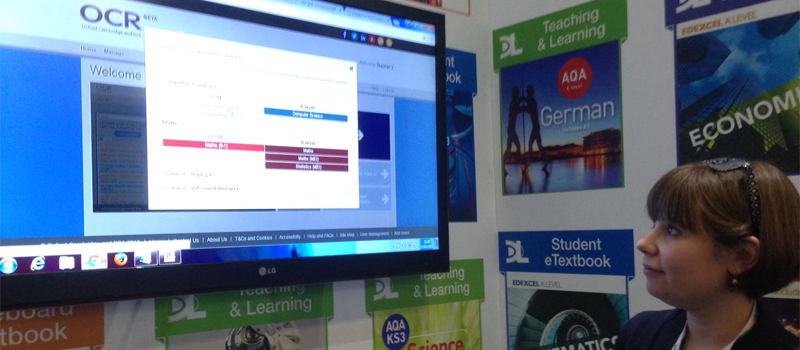Our Group Chief Executive, Simon Lebus, blogs from Bett on ed tech innovation and how our decades-old archives are helping to shape the future of learning.
A brief visit to the
Bett show a couple of weeks ago following the
Education World Forum; this has become a major international showcase for ed tech products from around the world and attracts ever increasing numbers of overseas visitors, ranging from ministers and ministry officials through to classroom teachers and pupils, with especially large numbers coming from Scandinavia and the Netherlands.
We used the opportunity to launch
ExamBuilder OCR's new (and free) mock assessment service. Developed in collaboration with Hodder, Exam Builder (pictured below in action at Bett) allows teachers to create mock GCSE and A Level exam papers in science, maths and computer science, using questions drawn from OCR's extensive archive of past papers. This is a hugely valuable resource and a powerful teaching aid, and it has also been deployed by
Isaac Physics, a Department for Education project at the University of Cambridge designed to support the development of physics insight and understanding through practising with physics problems. It is based on the principle of active learning and combines face-to-face events at partner schools and institutions across the UK with a range of online material that is accessible to both teachers and students. This draws extensively on our archive of old A Level, GCSE and O Level physics papers dating back to 1951, when A Levels were first introduced. One complaint often advanced against exams is that teaching to the test can kill a learner’s love of the subject and narrow their horizons. However, the Isaac Physics project is an interesting example of the reality that teaching to a well-designed test is a powerful way of helping students to master their subject.

That is also what lies behind our
English language exams, which are designed so that anybody taking a test can be sure, assuming they pass, that they will be capable of speaking, reading, writing, and listening to English at the level that the test they have taken is designed at - very important where students whose first language is not English take these tests before going to study in English speaking countries, as it gives them the confidence to know that they will be able to understand what they're listening to when they eventually get to their first lecture in English.
Active learning, of course, is also one of the things that has made
Raspberry Pi computers so successful. There was an
interesting piece in the New Statesman about how these were developed by some visionary veterans of the early computing and games industries in response to a reduction in the number of students coming to university to study computer science, with all the potentially adverse consequences that might have for the UK games and computing industry more generally. What was so interesting about the piece was the recognition of the need to ensure that practical and active learning is hard-wired into the curriculum. It’s very encouraging in this context that our own research picked up a "significant increase" in numbers of children choosing to study computer-based subjects at GCSE, following the introduction of the Raspberry Pi, with 2015 seeing a jump of 17%; powerful evidence of the positive impact such active learning approaches can have.
Simon Lebus
Group Chief Executive, Cambridge Assessment